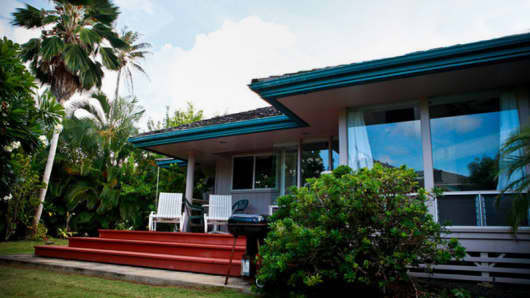Deana Shelby and her husband, Dave Klemer, can thank honeymooners for making their dream retirement in Hawaii a reality.
The couple moved to an oceanside home on the island of Kauai when Klemer retired from his job in the computer industry in 2007.
Their property included a one-bedroom cottage, which the couple dubbed “The Honeymoon Cottage,” and is available for rent at about $150 a night. In addition to a property manager, they use the web to woo guests, who are also charged $30 a day for Internet access and $20 for rides to and from the airport.
Across the country, Ellie Bryant and her retired husband, Harrison, have the same idea. They tap the web to rent out a treetop bedroom, labeled “The Tiny Fern Forest Treehouse,” next to their home in Lincoln, Vt., for about $100 a night.
The two enterprising couples are part of an emerging wave of retired “micropreneurs,” who pay for some of their living expenses by renting, sharing or swapping their big-ticket assets, such as homes, cars, airplanes and boats.
New online companies are making it easier, safer and more efficient for you to become a tiny rental agency. Both couples attract at least a third of their guests through Airbnb, a San Francisco-based global online marketplace for privately owned homes and rooms. Its online rivals include Roomoramaand Vacation Rentals by Owner.
For autos, online car-sharing services like Relay Rides enable you to make money by renting your underused vehicles. If you have a boat or a private plane that you are willing to share, ShareZenoffers you software and online assistance.
It’s all part of the so-called "Sharing Economy," or what experts call Collaborative Consumption, a movement fostered by people looking to expand the peer-to-peer transactions of eBay and Craigslist into other parts of life.
Rachel Botsman, co-author of “What's Mine is Yours: The Rise of Collaborative Consumption,” says the trend comes from people being comfortable with tech services that allow lending of goods and space at a massive scale. It also means that retirees can pay for their lifestyle in ways other than with cash — a promising solution for the huge problem of retiring boomers with limited cash.
How big is the sharing economy? Airbnb, which launched in 2008, has listings in more than 14,500 cities in 184 countries, with over 1.6 million local homes booked.
Overall, the vacation-rental space was valued at $80 billion in late 2011, according to Entrepreneur.com.
The North American car-sharing market, including Relay Rides and Zipcar, is projected to grow to 1.4 million members in 2012, up from 600,000 in 2011.
Let’s take a look at the situation of our Hawaiian transplants, Shelby and Klemer.
Their cottage, available for rent year 'round, is booked for about 60 percent of the time, says Shelby. That puts their rental income at about $28,000 a year before commissions. (Airbnb charges them 3 percent of the rental fee, or about $4.50 a night. Vacation property managers charge 10 percent to 30 percent of the rental fee, according to HomeAway.com.) The income covers the cost of the unit and contributes toward their overall expenses.
“We didn't realize how much it costs to live in Hawaii, realistically speaking, and having the rental income to defray the cost of maintaining the property we purchased is very important,” says Shelby.
She strongly advises against buying a place with the hope that renting it will pay your bills.
“But if you already own a place and are wondering should you try to get extra income from it, I'd say go for it,” she says.
Shawn Kemp, co-founder of ShareZen, sees the sharing trend infiltrating into affluent, retired households.
ShareZen markets a software tool that coordinates guests, co-owners and renters sharing a plane, house or boat. Since the company launched in April 2010, about 4,000 shared assets have been added to its online system. (Most of the assets are worth about $300,000.) The service is free for single owners and $25 a month for multiple owners.
“Most of our customers are about retirement age. Sharing larger ticket items allows them to continue to enjoy luxuries while paying just a portion of the costs,” says Kemp.
Company research shows a huge pool of potential owners. People use their boats for less than 100 hours a year and they generally use their second homes less than four weeks a year. Of the 100 million second homes in the U.S., only 2 million are actively rented.
RelayRides pioneered peer-to-peer car sharing when it launched in Boston in June 2010. In March 2012, the company expanded nationwide.
You sign up your vehicle on the company website, create an online profile, set an hourly and daily price and determine what kind of people can use the vehicle. You get 60 percent of the fee. The service handles billing, roadside assistance and insurance for the renter.
Clark, founder and chief community officer of RelayRides, says the average RelayRides car owner makes about $3,000 a year via the service.
“One car owner made $5,300 in less than 9 months off of a 2006 Honda Civic worth only $4,800,” he says.
If you like doing business online, have a knack for sites like Facebook, and want to meet new people, sharing-for-money may be an intriguing part of your retirement plan. But then you need to know something else: What kind of stuff is screaming to be shared?
A 2010 study by Shareable Magazine and Latitude research found that besides cars and vacation homes, people will pay to share expensive sporting goods, event equipment, specialized household items, and physical spaces like garages, parking spaces and spare rooms.
The bottom line — all those assets you’ve collected in your working years don’t have to be a drain on your nest egg.



